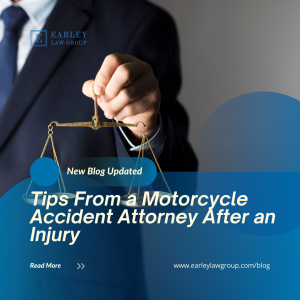
Motorcycle accident cases can have catastrophic consequences, leaving victims with serious injuries, emotional distress, and many challenges. If you’re in a motorcycle accident, knowing what to do is crucial for protecting your rights and making your recovery easier. Consulting a motorcycle accident attorney can provide helpful advice on actions to take and avoid after an […]
 Call Earley Before It’s Too Late!
Call Earley Before It’s Too Late!